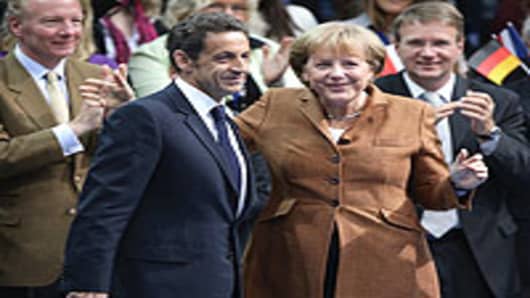German Chancellor Angela Merkel and French President Nicolas Sarkozy may wind up their Tuesday meeting with a list of accomplishments as empty as the streets of Paris in August.
Since it came to the financial markets' attention last week, the Paris meeting has been held out as a moment of hopefulness where some real resolution may be developed to solve the European debt crisis. But analysts say the expectations for what the two leaders can do may be too high.
"I think the key thing is whether there is a discussion of a common euro bond," said Mary Nicola, BNP Paribas currency strategist. However, French and German officials were quoted by wire services as saying the euro bond topic is not on the agenda, and Nicola notes the meeting is likely to focus on the things agreed to at their July 21 summit and economic governance issues.
Germany opposes the idea of a euro bond but some countries in the euro zone see it as a quicker solution to the lingering sovereign crisis.
The two leaders will hold a joint briefing at 12:30 p.m. ET. Earlier Tuesday, euro zone GDP will be released for the second quarter. Besides Europe, markets will be watching U.S. industrial production at 9:15 a.m., and housing starts and import prices at 8:30 a.m. Some major earnings are on the calendar, including Wal-mart , Home Depot , Saks and TJX , ahead of the open. Dell reports after the closing bell.
Market Mayhem
Stocks soared in a risk-on rally Monday, with the Dow finishing up 1.9 percent, or 213 points to 11,482. The S&P 500 vaulted 25 points, or 2.2 percent higher to 1204. The S&P is now about 5 percent above the lows of last Monday, and the major indices have wiped out last week's losses.
The stock market Monday ignored a very weak Empire state survey, which showed business conditions declining to minus 7.72 from minus 3.76 last month. But on the plus side, a rush of mergers, including Google's $12.5 billion bid for Motorola Mobility, helped pump up stocks.
Commodities also rose Monday, with oil gaining 2.9 percent to $87.88 per barrel. Investors sold bonds, driving the 10-year yield higher to 2.283 percent.
The euro regained ground against the dollar, rising to $1.444, or nearly 1.4 percent. It also gained against the Swiss franc, which slumped on speculation the Swiss National Bank will take more steps to curb the gains of the franc.
The euro was also the beneficiary of speculation about the Tuesday meeting between Merkel and Sarkozy. The meeting comes after a week of wild trading in which France, itself, was the focus of unfounded rumors that its AAA credit rating was about to be downgraded and talk that French banks were in trouble. It also comes as the European Central Bank has taken steps to stabilize markets by adding Italian and Spanish debt to its shopping list.
The ECB Monday revealed it last week settled 22 billion euros in bond purchases, its highest weekly settlement since it began buying eurozone bonds on the secondary market in May, 2010.
Investors are also watching Merkel and Sarkozy to see if it is likely Europe will expand its European Financial Stability Fund to support its sovereign bond markets. "That's one of the potential options," said Nicola. "That's one of the things analysts are calling for because it is going to raise concerns if the ECB keeps buying Italian and Spanish bonds."
Nomura Americas Treasury strategist George Goncalves does not expect much from the meeting. "Maybe I'm wrong, and they're going to shock the world, but I doubt it. What are their options? They're not at a place yet where they can come up with expanding the ESFS," said Goncalves.
European governments still need to vote on the latest bailout plan for Greece and other measures, agreed at the euro zone's July 21 meeting.
"What's happening in the background is the slowing down of the economy. Even shipping containers are down, and you're starting to see railroad cargos coming down," he said.
Goncalves said he went neutral on Treasurys last week. During the high velocity stock market moves, investors pushed the 10-year close to 2 percent briefly. "I doubt there is going to be a sell off so I'm not bearish the bond market. When 10-years got to 2 percent you really need things to come unglued very quickly for this market to go much further. It doesn't mean we have seen the lows in rates. We could see 1.75 (10-year yield) if Europe really gets in trouble and people run to Treasurys for safety," he said.
The risk on trade also weighted on bonds Monday, as stocks soared.
Brown Brothers Harriman stock strategist Andrew Burkly said the market's rally is likely to run out of steam when the S&P gets close to 1250. Burkly, like some market technicians, expects the market established its year high of 1370 on May 2, but it's not clear whether its hit the lows yet.
"Overall, we're not buying into the rally here," he said, adding the market could sell off once it hits 1250. "Then we'll retest the lows and undercut them a little bit."
Burkly said he wants to see a test of the 1101 low and improvement in the economic data before he becomes more constructive.
"We're certainly not in recession territory but we're stuck in this sub-2 percent growth, which is not enough to support earnings expectations for next year," he said.
Questions? Comments? Email us at marketinsider@cnbc.com



